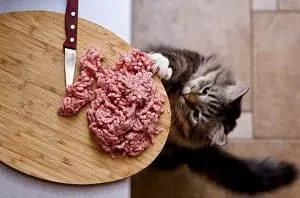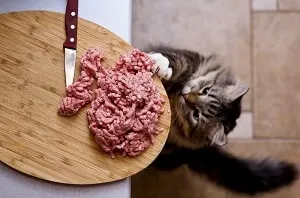 There’s a lot of talk about how cats are obligate carnivores, and that’s why there isn’t a good vegetarian or vegan diet option for cats. Now, I always want the best for my feline friends, so I naturally started to wonder if cats need more meat in their diets. Can my cats enjoy ground beef when I do? Is it good for them to have meat, especially ground beef, in their diets? Can cats eat ground beef?
There’s a lot of talk about how cats are obligate carnivores, and that’s why there isn’t a good vegetarian or vegan diet option for cats. Now, I always want the best for my feline friends, so I naturally started to wonder if cats need more meat in their diets. Can my cats enjoy ground beef when I do? Is it good for them to have meat, especially ground beef, in their diets? Can cats eat ground beef?
Cats can eat small amounts of ground beef. Ground beef does not supply critical vitamins and nutrients raw, or cooked that is essential for a cat to survive. Beef is a good source of protein for cats, but it’s also much fattier than their typical prey foods.
While I had an answer for ground beef, I wanted to know more about feeding ground beef and meat in general to my cats. Let’s take a closer look.
Can Cats Eat Hamburger
Cats can eat hamburgers but in small amounts.
You’re likely wondering about ground beef because that makes up the popular dish. While cats can eat hamburgers, it’s not something you should be giving them all the time.
As always, make sure the ground beef is fully cooked. Feeding cats partially cooked meat is unsafe and can lead to disease and sickness.
How To Cook Ground Beef for Cats
Cats need to have a very different kind of diet than humans or even dogs. We already mentioned that they are obligate carnivores, which means that their bodies are designed to get the nutrients they need from meat, not from fruits, vegetables, or grains.
Cats still need nutrients from those fruits, vegetables, and grains, but they’re going to process them differently and need different ratios.
Cats also have very different tolerances for spice and salt, so you shouldn’t just give your cat a couple of pieces of ground beef from your latest casserole. There are too many other ingredients in the casserole that can be harmful to your animals.
So the first rule of cooking ground beef for cats (or any cut of beef) is that you need to cook it specifically for your cat.
No table scraps. No food prepared for your dog. Certainly, no leftovers.
Most people and vets recommend thoroughly cooking any ground beef you feed to your cat. It should be unseasoned (seasoning can often be toxic to your cat), and you should buy the leanest possible variety and drain away any excess fat before serving.
If you’re feeding cooked ground beef, you can also consider adding cat-friend grains or vegetables to the beef in small amounts. Brown rice, oatmeal, carrots, or peas are all popular choices that your feline friend may enjoy.
Even if you’re adding grains and vegetables to your ground beef, you should treat these meals as a treat. Make them in very small portions for your cat, and don’t reduce or skip any of their other meals for the day since their kibble and canned food is fortified with vitamins, minerals, and enzymes that they need to thrive.
Of course, those rules only apply if you’re not creating a homemade diet for your cats. We’ll talk a little more about homemade cat diets in the next section, don’t worry.
One more time, here are the basics. Ground beef for cats should be:
- A treat, not a meal
- Fully cooked
- Lean and drained of fat
- Unseasoned
- (optional) served with cat-friendly cooked grains and vegetables
Pretty simple, right? I was excited to learn that I could include ground beef as a food for my cats to give them a richer, more varied diet, but I wondered if cooked ground beef was the only option.
Can Cats Safely Eat Raw Meat
Yes, cats can safely eat raw meat. However, when it comes to ground beef, the meat needs to be fully cooked.
Raw diets, or even diets that include a small amount of raw meat, are one place where it can be hard to tell if this is a good and healthy option for your cat.
Wild cats certainly don’t roast their prey over a fire before eating, so feral cats are almost certainly used to eating their meat raw.
So why not feed raw meat to your cats at home?
Well, there are a couple of problems with feeding raw meat. For one thing, not all raw meat is safe; not even the meat sold to people at the grocery store is guaranteed to be pathogen and parasite free.
That’s why grocery stores and restaurants have disclaimer warnings on any product that can be sold partially cooked or raw. They know that there is a small risk that something harmful is one that food that would be killed during the cooking process but can be dangerous if their food is eaten raw or undercooked.
Many people take those risks in part because it’s pretty easy to tell if you’ve gotten food poisoning. Even more severe parasitic infections have some fairly obvious symptoms that will send you to a doctor if you know you’re at risk.
Here’s the problem for cats: they can’t tell you they aren’t feeling well.
Attentive pet parents will probably have some idea that their feline friends aren’t at their best; cats do act differently when they are sick or injured. But you won’t know why they aren’t functioning normally. It could seem like your cat is just a little lethargic, so you may miss the warning signs that something more serious is going on.
That’s the main problem with serving raw meat to your cats. Now, it’s usually a relatively small risk as long as you make sure you’re buying your meat from reputable sources, clean it thoroughly, and store the meat properly refrigerated or frozen until serving.
The other problem with feeding raw meat is that it’s challenging to get the right balance of meats and other foods, ensuring that your cat is getting a good balance of nutrients, supplemental vitamins and minerals, carbs, proteins, and fats.
There’s a lot of complicated science that goes into creating a balanced raw meat meal, so we recommend either doing the research and consulting with your vet to create a balanced meal plan.
But, if you’re wanting to serve small amounts of raw meat as a treat, there are still some limitations you need to follow. After all, not all meat is created equal, and your cats really shouldn’t have every type of meat out there.
What Kinds of Raw Meat Can Cats Eat
As a general rule of thumb, cats should only eat lean cuts of meat that have been processed as little as possible before they eat it.
Now, there is a difference between commercial processing and processing at home. Grinding your own meat, cooking it, or adding other ingredients to benefit your cat are all fine. But canned meats, salted and pre-seasoned meats are generally not a good idea.
While you can feed the occasional high-fat meat, you should keep those cuts and kinds of meat to a minimum. Bacon, for instance, is both fatty and salty. Cats may love small amounts as an occasional treat, but bacon, ham, and other processed seasoned meats should be kept to a minimum or excluded entirely.
If you’re feeding a larger amount of raw meat to your cat, you should also try to feed a variety of meats. Chicken, fish, and red meat can all add to your cat’s diet, assuming you have a safe and hygienic source, but too much of any of them may lead to nutritional imbalances that are harmful to your cat’s health.
Remember that there are commercially made raw diets that can serve as full meals or treats for your cat that are designed to be balanced and healthy for most cats.
Is It Good For Cats To Eat Raw Meat
This is a controversial question. Many people think that raw meat is very good for your cat and offers a more natural kind of diet for them to enjoy. Others think that the risks associated with feeding raw outweigh the benefits, even for the occasional treat.
Even vets are torn on the issue, with many saying that attempting a raw diet isn’t a good idea. Depending on the vet, that may be because of issues with raw meats, issues with food safety in preparation of those foods, or simply the difficulty of creating a well-balanced raw food for your cat.
If you do the research and are willing to buy a high-quality raw meat-based food or create one yourself, raw meat can be good for your cat just like any other high quality and healthy food can be good for your cat.
But if you’re worried that feeding raw meat takes too much time and dedication, don’t worry; your cat can be healthy and happy on a wet food or kibble diet too.
Should I Feed My Cats A Raw Diet
Many people wonder if they should feed their cat’s a raw diet, and we’re not going to address the health reasons for or against here. We’ve already talked a lot about the complicated process of creating a good raw diet, and there isn’t enough time to get into the details of recipes and feeding schedules here.
Instead, we wanted to address one simple thing. Is feeding your cat a raw diet right for you?
There are lots of reasons you might want to feed a raw diet:
- Your cat has dietary restrictions that make finding pre-made food difficult
- You want to give your cat a more natural diet
- Your cat is a picky eater and refuses other kinds of food
- Your cat has more energy and personality on a raw diet
But there are lots of reasons not to feed raw as well:
- You’re worried you wouldn’t notice a parasite or food-borne illness in your cat
- You don’t have a lot of free time to prepare raw meals for your cat
- Your cat prefers to be free-fed instead of having set mealtimes
- You don’t have room to store refrigerated or frozen raw foods safely
Any other reason for choosing to feed raw or not to feed raw is a personal decision, just like choosing to feed cooked ground beef is a personal decision. No one should shame you for your decision, no matter what decision that is.

My name is James, and welcome to FAQCats!
Along with our team of cat owners, expert pet enthusiasts, and pet professionals, we aim to write engaging helpful, engaging content about cats. At FAQCats we strive to provide content that’s accurate and fun to read. Our team writes about everything related to cats; even the most complex of topics. Through extensive research and caring for our own fur-pals, we’re able to provide something cat owners worldwide will love. Have a look around, and leave us feedback anytime!

